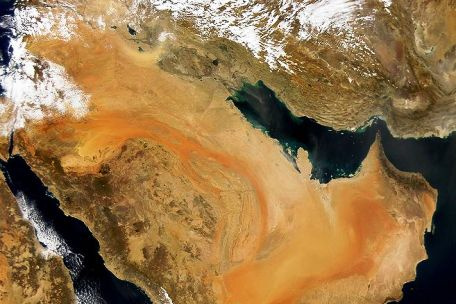Bahrain: Pretext for Establishment of a Missile Defense Shield

By: Makan Eidypour
During 1960s and 1970s, the missile industry underwent a great leap across the world, as the leading powers mastered the knowhow to use missiles as carriers of nuclear warheads and bombs. Earlier, the militaries relied on their air forces to carry nuclear bombs but with the revolutionary breakthrough, they could not be countered by a similar device. As the new military prodigy established its place in the nuclear arrangements, the issue of its containment came to the fore: novel ideas such as Ronald Reagan’s “Star Wars” and the Missile Defense Shield emerged in response to calls for missile containment as a means to render ineffective the nuclear deterrence strategy.
The missile defense shield was in favor up until the dissolution of the Soviet Union, when it came under doubt due to its high expense. At the outset of the 21st century, in which China and Russia have resurged as globally powerful, nuclear deterrence has been revived as a defense strategy and with Iran’s progress in missile technology, missile containment resurfaces as a top priority in the US defense doctrine. In recent years, there have been great markets for a missile defense shield in the region, and the Persian Gulf Arab countries have shown a particular thirst to purchase military hardware. This trend can be analyzed from two dimensions, i.e. economic and political. Economically speaking, the missile industry has proved quite a lucrative business for the United States. From the political aspect, by selling these weapons and touting their function, the US provides Arab countries with peace of mind to prevent them from devising independent domestic plans. Being in need of long-term security due to their low defense capabilities and insignificant involvement in the regional security arrangements, the Persian Gulf countries unrealistically assume that they are threatened by the Iran’s missile power, as the country is increasingly demonized by the US. However, the establishment of a missile defense shield in the Middle East is not a new development: a few years ago, the UAE requested that Washington incorporate it in an international missile defense structure.
Bahrain: just a pretext
Bahrain –the would-be-host of the shield- is a mere pretext for the US to contain Iran. If the country turns into a hotspot for Sunni and Shi’a leaders, deploying the shield would make some sense. But it has never been so, as Bahrain does not share any borders with Iran and the US Navy is already patrolling the Persian Gulf. Thus, no direct involvement is needed on the part of Washington to defend Bahrain. The issue should be analyzed in the framework of a security dilemma and its domino regional effect: the US has always tried to resolve its regional concerns through stifling regional states’ quest for self-sufficiency. The country has tried to cover up Israel’s threats through entertaining Egypt, Syria and even Jordan with weapons or political inculcation. The same is true of the Persian Gulf countries: the illusionary threat of Iran, forged to instill fear among the Persian Gulf littoral states, may eventually backfire if those states view the current security arrangements as ineffective in protecting them from the “Iran threat”, and they may embark on their domestic military nuclear projects to curb Tehran.
* Makan Eidypour is a strategic affairs expert.

